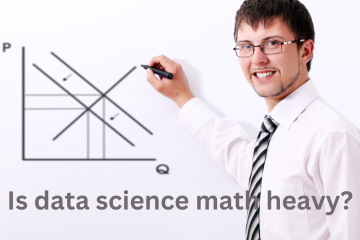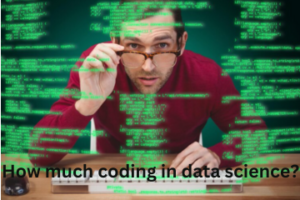Table of Contents
ToggleYes, data science is often considered math-heavy. Mathematics forms the foundation of many data science concepts and techniques. Data scientists use various mathematical principles, such as linear algebra, calculus, probability theory, and statistics, to analyse and interpret data, build models, and make predictions.
Being a Data science is just a step away. Check out the Best Data Science in Hyderabad. Get trained by the alumni from IIT, IIM, and ISB.
Here are a few areas within data science where mathematical knowledge is commonly applied:
Statistics:
Understanding statistical concepts and methods is essential for data scientists. They use statistics to analyse data, determine patterns, make inferences, and draw conclusions.
Machine Learning: Machine learning algorithms rely on mathematical concepts such as optimization, linear algebra, and calculus. These concepts help in training models, optimizing their performance, and making predictions.
Probability Theory: Probability theory is fundamental to data science. Data scientists use it to model uncertainty, estimate probabilities, and make probabilistic predictions.
Algorithms and Computational Methods: Data scientists need to understand the mathematical principles behind various algorithms and computational methods used for data analysis, feature engineering, and model building.
Statistics: Statistics is the backbone of data science. Data scientists rely on statistical methods to analyse data, identify patterns, and draw meaningful conclusions. They use descriptive statistics to summarize data and inferential statistics to make inferences about populations based on sample data. Concepts like mean, median, standard deviation, hypothesis testing, confidence intervals, and regression analysis are all rooted in statistics.
360DigiTMG offers the Best Data Science in Pune. To start a career in Data Science. Enroll now!
Probability Theory: Probability theory is fundamental to understanding uncertainty and randomness in data. Data scientists use probability theory to model uncertain events, estimate probabilities, and make probabilistic predictions. Concepts such as conditional probability, Bayes’ theorem, and probability distributions (e.g., Gaussian, binomial, Poisson) are commonly used in data science applications like Bayesian inference, decision theory, and probabilistic modelling.
Linear Algebra: Linear algebra is extensively used in data science, particularly in machine learning and data manipulation. Matrices and vectors are essential for representing and manipulating data. Data scientists use techniques like matrix operations, matrix factorization, eigenvalues, and eigenvectors for tasks like dimensionality reduction, feature extraction, and solving systems of equations. Methods like principal component analysis (PCA) and singular value decomposition (SVD) rely heavily on linear algebra.
Calculus:
Calculus is important for optimization and modelling continuous relationships. Data scientists use techniques from calculus, such as differentiation and integration, for optimization problems. Gradient descent, a widely used optimization algorithm in machine learning, relies on calculus to find the minimum of a function. Calculus is also relevant in modelling continuous processes, such as time-series analysis or differential equations.
Learn the core concepts of Data Science Course video on Youtube:
Machine Learning: Machine learning algorithms form a significant part of data science. These algorithms learn patterns and make predictions from data. Many machine learning techniques, such as linear regression, logistic regression, support vector machines, neural networks, decision trees, and random forests, have mathematical foundations. Understanding the mathematical principles behind these algorithms helps data scientists select appropriate models, train them effectively, and tune their performance.
Data Visualization: Data visualization is a powerful tool for communicating insights and findings. It involves creating graphical representations of data. While visualization tools and libraries simplify the process, understanding the underlying principles requires a solid grasp of mathematical concepts like scaling, coordinate systems, colour theory, and graphical perception. Data scientists use these principles to design effective visualizations that accurately represent data and facilitate understanding.
Experimental Design: Experimental design is crucial for conducting effective data science experiments and studies. Data scientists need to understand concepts like sampling methods, randomization, statistical power, and hypothesis testing to design experiments that yield reliable and meaningful results. Proper experimental design ensures that data scientists can draw valid conclusions from their analyses.
Optimization: Optimization is a key aspect of data science, especially in machine learning and model building. Data scientists often encounter problems that require finding the best solution from a vast search space. Optimization algorithms, such as gradient descent, stochastic gradient descent, and convex optimization, rely on mathematical techniques to find optimal values for model parameters. Understanding these optimization algorithms and their mathematical foundations allows data scientists to effectively train models and improve their performance.
Time Series Analysis: Time series data is prevalent in many domains, including finance, economics, weather forecasting, and signal processing. Data scientists employ mathematical methods, such as autoregressive integrated moving average (ARIMA) models, Fourier transforms, and spectral analysis, to analyse and model time-dependent data. Time series analysis requires understanding concepts like autocorrelation, stationarity, and seasonality, which are rooted in mathematics.
360DigiTMG offers the Best Data Science in Chennai. To start a career in Data Science. Enroll now!
Big Data and Scalability:
Dealing with large-scale datasets is a common challenge in data science. Data scientists need to understand mathematical concepts related to scalability and distributed computing to efficiently process and analyse big data. Techniques such as map-reduce, parallel computing, and distributed algorithms involve mathematical concepts like combinatorics, graph theory, and computational complexity, enabling data scientists to handle and extract insights from massive datasets.
Statistical Learning Theory: Statistical learning theory provides the theoretical foundations for understanding machine learning algorithms. It combines concepts from statistics and optimization to analyse the performance, generalization, and complexity of learning algorithms. Data scientists who have a strong mathematical background can delve into the theoretical aspects of machine learning and make informed decisions about algorithm selection, regularization techniques, and model complexity.
Data Science Research and Innovation: Data scientists often engage in research and innovation to advance the field. Developing new algorithms, improving existing models, and solving complex problems require mathematical expertise. Mathematical thinking allows data scientists to explore new approaches, develop novel methodologies, and contribute to the cutting-edge of data science research.
Feature Engineering:
Feature engineering is a crucial step in data pre-processing and model building. It involves transforming raw data into meaningful features that can improve the performance of machine learning models. Mathematical techniques, such as scaling, normalization, polynomial features, and feature selection methods, help data scientists identify and create relevant features. Feature engineering requires a mathematical understanding of the relationships between variables and the impact of different transformations on the data.
Data Science is a promising career option. Enroll in Best Data Science in Bangalore. Program offered by 360DigiTMG to become a successful Data science Expert!.
Experimental Simulation and Modelling: In certain scenarios, data scientists may need to simulate experiments or create mathematical models to understand complex systems or phenomena. This requires mathematical modelling techniques, differential equations, numerical methods, and simulation algorithms. Data scientists use mathematical models to simulate the behaviour of systems, analyse the impact of different variables, and make predictions. This combination of mathematics and data science allows for deeper insights and predictions beyond what can be obtained solely from empirical data.
Data Science Placement Success Story
Data Science Training Institutes in Other Locations
Tirunelveli, Kothrud, Ahmedabad, Hebbal, Chengalpattu, Borivali, Udaipur, Trichur, Tiruchchirappalli, Srinagar, Ludhiana, Shimoga, Shimla, Siliguri, Rourkela, Roorkee, Pondicherry, Rajkot, Ranchi, Rohtak, Pimpri, Moradabad, Mohali, Meerut, Madurai, Kolhapur, Khammam, Jodhpur, Jamshedpur, Jammu, Jalandhar, Jabalpur, Gandhinagar, Ghaziabad, Gorakhpur, Gwalior, Ernakulam, Erode, Durgapur, Dombivli, Dehradun, Cochin, Bhubaneswar, Bhopal, Anantapur, Anand, Amritsar, Agra , Kharadi, Calicut, Yelahanka, Salem, Thane, Andhra Pradesh, Greater Warangal, Kompally, Mumbai, Anna Nagar, ECIL, Guduvanchery, Kalaburagi, Porur, Chromepet, Kochi, Kolkata, Indore, Navi Mumbai, Raipur, Coimbatore, Bhilai, Dilsukhnagar, Thoraipakkam, Uppal, Vijayawada, Vizag, Gurgaon, Bangalore, Surat, Kanpur, Chennai, Aurangabad, Hoodi,Noida, Trichy, Mangalore, Mysore, Delhi NCR, Chandigarh, Guwahati, Guntur, Varanasi, Faridabad, Thiruvananthapuram, Nashik, Patna, Lucknow, Nagpur, Vadodara, Jaipur, Hyderabad, Pune, Kalyan.
Data Analyst Courses In Other Locations
Tirunelveli, Kothrud, Ahmedabad, Chengalpattu, Borivali, Udaipur, Trichur, Tiruchchirappalli, Srinagar, Ludhiana, Shimoga, Shimla, Siliguri, Rourkela, Roorkee, Pondicherry, Rohtak, Ranchi, Rajkot, Pimpri, Moradabad, Mohali, Meerut, Madurai, Kolhapur, Khammam, Jodhpur, Jamshedpur, Jammu, Jalandhar, Jabalpur, Gwalior, Gorakhpur, Ghaziabad, Gandhinagar, Erode, Ernakulam, Durgapur, Dombivli, Dehradun, Bhubaneswar, Cochin, Bhopal, Anantapur, Anand, Amritsar, Agra, Kharadi, Calicut, Yelahanka, Salem, Thane, Andhra Pradesh, Warangal, Kompally, Mumbai, Anna Nagar, Dilsukhnagar, ECIL, Chromepet, Thoraipakkam, Uppal, Bhilai, Guduvanchery, Indore, Kalaburagi, Kochi, Navi Mumbai, Porur, Raipur, Vijayawada, Vizag, Surat, Kanpur, Aurangabad, Trichy, Mangalore, Mysore, Chandigarh, Guwahati, Guntur, Varanasi, Faridabad, Thiruvananthapuram, Nashik, Patna, Lucknow, Nagpur, Vadodara, Jaipur, Hyderabad, Pune, Kalyan, Delhi, Kolkata, Noida, Chennai, Bangalore, Gurgaon, Coimbatore.
Navigate to Address:
360DigiTMG – Data Science Course Training in Chennai, Data Analytics, AI Institute in Anna Nagar
Ground floor, Fuel WorkSpaces, 25, 15th Main Rd, H Block, Anna Nagar, Ranganathan Garden, Anna Nagar, Chennai, Tamil Nadu 600040
Phone: 1800 212 654 321
GET IN DIRECTION: Data science course with placement guarantee chennai .
SOURCE LINK: it companies in anna nagar
Here are some resources to check out: Introduction to matplotlib : Types of Plots, Key features




